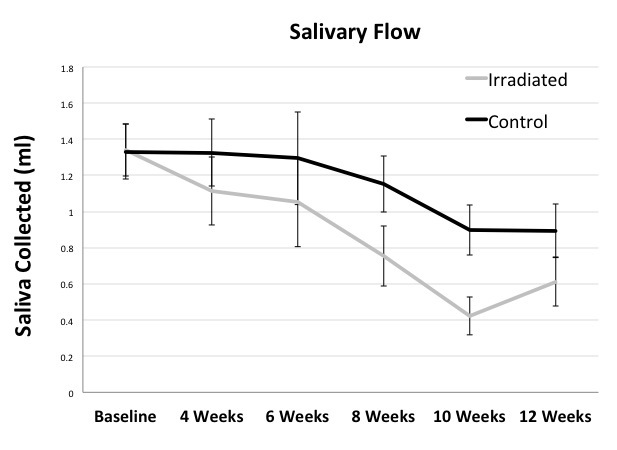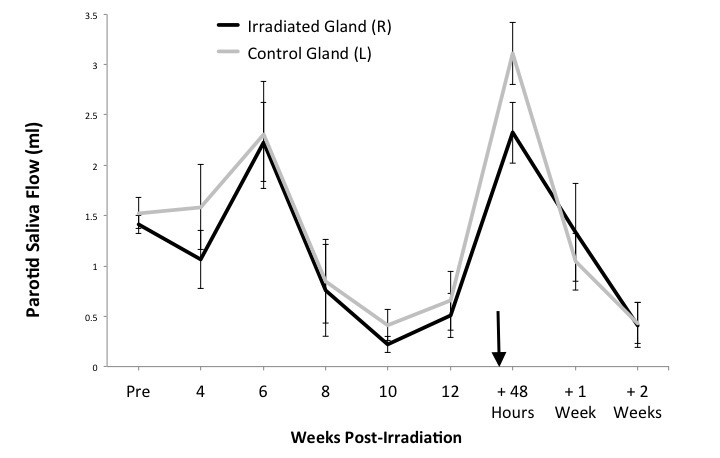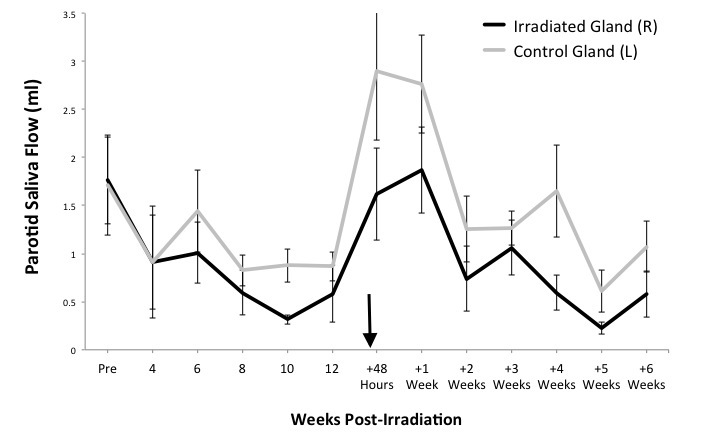IADR Abstract Archives
Ultrasound-Assisted Non-Viral Gene Transfer of AQP1 to the Irradiated Minipig Salivary Gland Restores Parotid Fluid Secretion
Objectives: Gene therapy using AQP1 delivered by an Adenoviral vector has been shown to relieve objective hyposalivation and subjective xerostomia in a human clinical trial involving patients suffering from radiation-induced xerostomia. We sought to compare the therpaeutic efficacy of AQP1 delivered by Adenovirus as opposed to ultrasound-assisted gene transfer ("sonoporation") in the penultiamte preclinical model, the irradiated swine.
Methods: Male Yucatan mini swine weighing approximately 10 kg were irradiated wtih 10Gy to the right parotid gland using an electron beam. Isolated parotid saliva from the right and left glands was collected 4, 6, 8, 10, and 12 weeks following irradiation. At 12 weeks, one group of animals (n=4) received 1x1010 vp of an Adenovirus expressing human AQP1. At 14 weeks, two other groups of animals received ultrasound-assisted gene transfer (UAGT) of either porcine AQP1 (n=4) or MetLuc (n=4). Saliva was collected 2 days, 7 days, and 14 days post-treatment.
Results: 1) Unilateral electron beam irradiation of the right parotid gland of the swine resulted in profound and durable bilateral hyposalivation.
2) UAGT enables robust non-viral gene transfer to the salivary gland of the mini swine.
3) Gene therapy with AQP1 delivered to the injured gland resulted in increased parotid fluid secretion; the volume of this fluid was similar between animals treated with AdAQP1 and UAGT/AQP1.
Conclusions: Unilateral radiation of the parotid gland impairs the function of the contralateral gland, and this presumbaly neurological phenomenon may be important in humans suffering from radiation-induced xerostomia.
UAGT is a viable alternative to Adenoviral delivery for the treatment of radiation-induced xerostomia in the miniswine and should be considered for study in a human clinical trial.
Methods: Male Yucatan mini swine weighing approximately 10 kg were irradiated wtih 10Gy to the right parotid gland using an electron beam. Isolated parotid saliva from the right and left glands was collected 4, 6, 8, 10, and 12 weeks following irradiation. At 12 weeks, one group of animals (n=4) received 1x1010 vp of an Adenovirus expressing human AQP1. At 14 weeks, two other groups of animals received ultrasound-assisted gene transfer (UAGT) of either porcine AQP1 (n=4) or MetLuc (n=4). Saliva was collected 2 days, 7 days, and 14 days post-treatment.
Results: 1) Unilateral electron beam irradiation of the right parotid gland of the swine resulted in profound and durable bilateral hyposalivation.
2) UAGT enables robust non-viral gene transfer to the salivary gland of the mini swine.
3) Gene therapy with AQP1 delivered to the injured gland resulted in increased parotid fluid secretion; the volume of this fluid was similar between animals treated with AdAQP1 and UAGT/AQP1.
Conclusions: Unilateral radiation of the parotid gland impairs the function of the contralateral gland, and this presumbaly neurological phenomenon may be important in humans suffering from radiation-induced xerostomia.
UAGT is a viable alternative to Adenoviral delivery for the treatment of radiation-induced xerostomia in the miniswine and should be considered for study in a human clinical trial.



